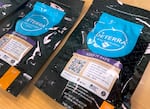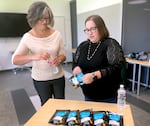At a time when drug-related deaths among Oregon teens are increasing faster than anywhere in the country, the state’s largest district wants families to have a new tool to help respond.
Portland Public Schools distributed more than 14,000 Deterra bags to high schoolers throughout the city during registration last month thanks to a partnership with Multnomah County. More bags will be passed out at upcoming school events and through the county’s existing youth prevention program, the Big Village Coalition.
Officials said the crinkly, black pouches are biodegradable and have non-toxic, carbon-activated crystals inside. They say they’re simple to use: Just open the bag, pour in the drugs, add water and seal it shut. The crystals break down whatever’s inside, from expired Ibuprofen to marijuana to heroin. One bag neutralizes up to 45 pills, six ounces of liquid or six patches.
“We’re really working to get upstream of substance use issues,” said Mary Stevens-Krogh, Portland’s district coordinator for substance use supports. “So often, kids start misusing substances by getting into the medicine cabinet at home.”

Drug-deactivating Deterra bags sit on display at a demonstration at McDaniel High School in Portland on Sept. 14, 2023. These bags were provided to every Portland high schooler this year during registration.
Natalie Pate / OPB
Unlike throwing drugs away in the trash where someone else could get them, or flushing them down the toilet into the shared sewage system, Stevens-Krogh said the bags are safe and environmentally friendly.
The bag isn’t meant to be an end-all solution to Oregon’s growing drug problems. District and county officials know some kids will simply throw them away. And they aren’t encouraging teens to seek out drugs to deactivate.
However, they hope the bags can be a small but useful tool, should the need arise. Students can use them if they come across unknown substances and families can use them to clear out their medicine cabinets. But officials also hope, more generally, the bags spark talks within families about drug prevention.
“Starting those conversations early and having them often is really important,” Stevens-Krogh said. The PPS bags have a QR code on the outside that leads to tips for parents on how to have these talks.
“There are dangerous substances in our community — our community is struggling with that a lot right now,” she said. “That means they don’t take any medications from any friends ever. Because we don’t know what could be in it.”
Part of the bigger picture
Clair Raujol grew up as the child of an addict. She now works as the addictions prevention coordinator at Multnomah County.
Raujol said there is a common profile for the most likely candidates to develop an opioid or substance problem: young people who live in homes where they can easily find substances and where they believe there’s a “pill that will solve every problem.”
This is especially important as the rate of fentanyl-related deaths in Oregon and nationwide continues to climb.
“Most youth who are accessing fentanyl, we know it’s fentanyl-laced. So, they are taking a substance that they didn’t know had fentanyl in it,” Raujol said. “But then we have to get to the motivating factor of why they were taking whatever they thought they were taking.
“Were they taking an Oxy? Were they taking an Adderall?” she posed. “Are they taking something else that was laced? And why were they taking it if it wasn’t prescribed to them?”

Mary Stevens-Krogh, left, the district coordinator of substance use supports at Portland Public Schools, and Clair Raujol, right, addictions prevention coordinator at Multnomah County, demonstrate how to use the drug-deactivating Deterra bags at Leodis V. McDaniel High School in Portland on Sept. 14, 2023. These bags were provided to every Portland high schooler this year during registration.
Natalie Pate / OPB
Stevens-Krogh said the bags are one of many drug-prevention efforts in schools, the main one being lessons in the K-12 health curriculum.
In second grade, she said, kids are taught to take medicine only from a doctor or a parent at home. By fourth grade, schools start talking about alcohol. It continues through high school.
But the bulk of PPS’ drug and alcohol prevention education happens in middle school, Stevens-Krogh explained, when kids are starting to make a lot of those choices.
“We’re talking to kids about how to navigate how to say ‘no’ when you need to, how to get help if you’re having emotional issues so that kids don’t turn to substances,” she listed, adding that it’s also important to understand how things like alcohol and vape products are especially marketed to young teens.
There are efforts at the state and federal levels to increase this kind of education.
The Oregon Health Authority and the Oregon Department of Education last year created the Fentanyl & Opioid Response Toolkit for Schools. In April, members of Oregon’s congressional delegation urged the U.S. Department of Education to continue and expand its education and prevention efforts with school districts.
And Oregon lawmakers this year passed Senate Bill 238. The new law directs state agencies to develop lessons that help kids learn about the dangers of certain drugs, such as fentanyl. The new law also calls for lessons to teach students about legal protections for people who report drug or alcohol use or who seek treatment for themselves or others.
Still, Stevens-Krogh and Raujol stressed the critical role families play.
Even when a teen is telling their parents they “can’t stand them and they don’t want to talk to them anymore,” Stevens-Krogh said, “one of the most influential factors in their lives is still their parent.”
